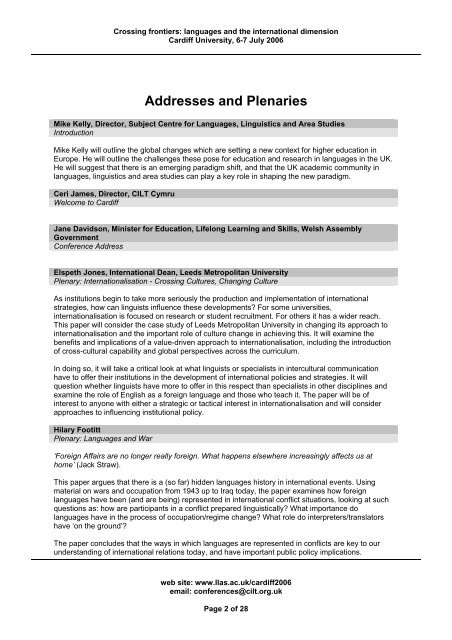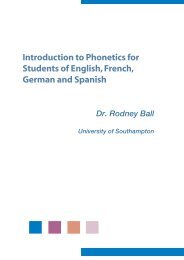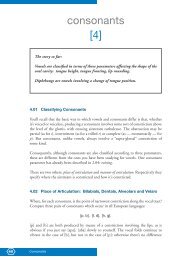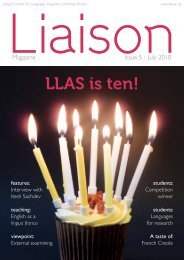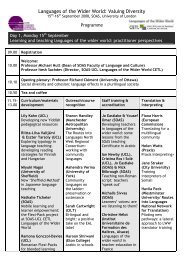Crossing frontiers: Languages and the international dimension
Crossing frontiers: Languages and the international dimension
Crossing frontiers: Languages and the international dimension
Create successful ePaper yourself
Turn your PDF publications into a flip-book with our unique Google optimized e-Paper software.
<strong>Crossing</strong> <strong>frontiers</strong>: languages <strong>and</strong> <strong>the</strong> <strong>international</strong> <strong>dimension</strong><br />
Cardiff University, 6-7 July 2006<br />
Addresses <strong>and</strong> Plenaries<br />
Mike Kelly, Director, Subject Centre for <strong>Languages</strong>, Linguistics <strong>and</strong> Area Studies<br />
Introduction<br />
Mike Kelly will outline <strong>the</strong> global changes which are setting a new context for higher education in<br />
Europe. He will outline <strong>the</strong> challenges <strong>the</strong>se pose for education <strong>and</strong> research in languages in <strong>the</strong> UK.<br />
He will suggest that <strong>the</strong>re is an emerging paradigm shift, <strong>and</strong> that <strong>the</strong> UK academic community in<br />
languages, linguistics <strong>and</strong> area studies can play a key role in shaping <strong>the</strong> new paradigm.<br />
Ceri James, Director, CILT Cymru<br />
Welcome to Cardiff<br />
Jane Davidson, Minister for Education, Lifelong Learning <strong>and</strong> Skills, Welsh Assembly<br />
Government<br />
Conference Address<br />
Elspeth Jones, International Dean, Leeds Metropolitan University<br />
Plenary: Internationalisation - <strong>Crossing</strong> Cultures, Changing Culture<br />
As institutions begin to take more seriously <strong>the</strong> production <strong>and</strong> implementation of <strong>international</strong><br />
strategies, how can linguists influence <strong>the</strong>se developments? For some universities,<br />
<strong>international</strong>isation is focused on research or student recruitment. For o<strong>the</strong>rs it has a wider reach.<br />
This paper will consider <strong>the</strong> case study of Leeds Metropolitan University in changing its approach to<br />
<strong>international</strong>isation <strong>and</strong> <strong>the</strong> important role of culture change in achieving this. It will examine <strong>the</strong><br />
benefits <strong>and</strong> implications of a value-driven approach to <strong>international</strong>isation, including <strong>the</strong> introduction<br />
of cross-cultural capability <strong>and</strong> global perspectives across <strong>the</strong> curriculum.<br />
In doing so, it will take a critical look at what linguists or specialists in intercultural communication<br />
have to offer <strong>the</strong>ir institutions in <strong>the</strong> development of <strong>international</strong> policies <strong>and</strong> strategies. It will<br />
question whe<strong>the</strong>r linguists have more to offer in this respect than specialists in o<strong>the</strong>r disciplines <strong>and</strong><br />
examine <strong>the</strong> role of English as a foreign language <strong>and</strong> those who teach it. The paper will be of<br />
interest to anyone with ei<strong>the</strong>r a strategic or tactical interest in <strong>international</strong>isation <strong>and</strong> will consider<br />
approaches to influencing institutional policy.<br />
Hilary Footitt<br />
Plenary: <strong>Languages</strong> <strong>and</strong> War<br />
‘Foreign Affairs are no longer really foreign. What happens elsewhere increasingly affects us at<br />
home’ (Jack Straw).<br />
This paper argues that <strong>the</strong>re is a (so far) hidden languages history in <strong>international</strong> events. Using<br />
material on wars <strong>and</strong> occupation from 1943 up to Iraq today, <strong>the</strong> paper examines how foreign<br />
languages have been (<strong>and</strong> are being) represented in <strong>international</strong> conflict situations, looking at such<br />
questions as: how are participants in a conflict prepared linguistically? What importance do<br />
languages have in <strong>the</strong> process of occupation/regime change? What role do interpreters/translators<br />
have ‘on <strong>the</strong> ground’?<br />
The paper concludes that <strong>the</strong> ways in which languages are represented in conflicts are key to our<br />
underst<strong>and</strong>ing of <strong>international</strong> relations today, <strong>and</strong> have important public policy implications.<br />
web site: www.llas.ac.uk/cardiff2006<br />
email: conferences@cilt.org.uk<br />
Page 2 of 28


